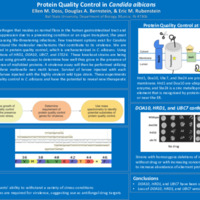Browse Exhibits (1 total)
Ellen Doss | Protein Quality Control in Candida albicans

Candida albicans is an opportunistic fungal pathogen that resides as normal flora in the human gastrointestinal tract and mouth. However, upon a patient’s immunosuppression due to a preexisting condition or an organ transplant, the yeast can colonize nearly every tissue and organ, causing life-threatening infections. Few treatment options exist for Candida infections; therefore, it is essential to understand the molecular mechanisms that contribute to its virulence. We are characterizing the roles of four genes involved in protein quality control, which is uncharacterized in C. albicans. Using CRISPR, we are generating homozygous deletions of HRD1, DOA10, UBC7, and STE24. These knockout strains are being characterized and compared to wild type yeast using growth assays to determine how well they grow in the presence of compounds predicted to increase the abundance of misfolded proteins. A virulence assay will then be performed utilizing a characterized insect infection model, Galleria mellonella wax moth larvae. Survival of larvae injected with each knockout strain will be compared to that of larvae injected with the highly virulent wild type strain. These experiments represent a novel investigation of protein quality control in C. albicans and have the potential to reveal new therapeutic targets for fungal infections.
Faculty Mentors: Dr. Eric (VJ) Rubenstein, Dr. Douglas Bernstein
Department of Biology
Graduate
